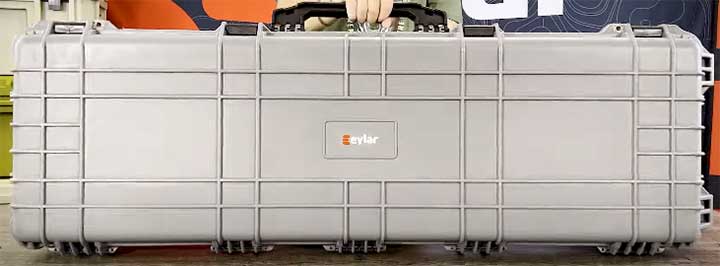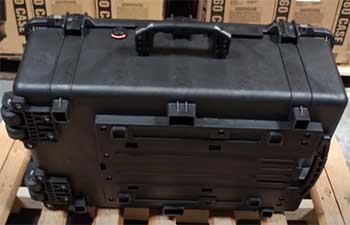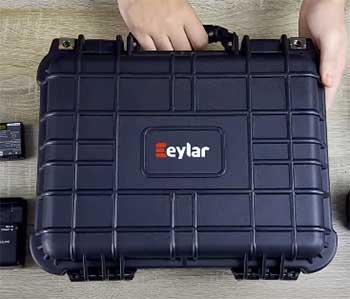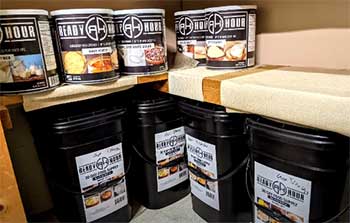If you need to protect sensitive equipment like cameras, electronics, or tools when traveling or working in tough environments, a protective case is a must-have accessory. Two of the most popular brands for heavy-duty protective cases are Eylar and Pelican. But which is better?
I’ve used both Eylar and Pelican cases extensively and can share my experiences on the pros and cons of each. This guide will compare the durability, features, customizability, cost, warranties, and more so you can decide which rugged case is right for your needs.
A Brief Comparison Table
| Feature | Eylar | Pelican |
| Durability | Extremely durable, can withstand drops, vibration, dust, etc. Military standard rated. | Also extremely durable with similar certifications. |
| Cost | More affordable, generally lower priced. | Premium pricing, costs significantly more. |
| Customization | Some options like color and foam thickness. Premade bundles available. | Highly customizable cases, foam, dividers, etc. Custom case designer tool. |
| Features | Pick and pluck foam, some models have wheels and clear lids. Pressure release valve. | TrekPak dividers, open cell core, purge valve, fold-down handles. |
| Warranty | Limited lifetime warranty on defects, not damage. | Similar lifetime warranty on materials/defects only. |
| Airline Approval | Some Eylar models approved for carry-on. | Many sizes meet carry-on regs. TSA-approved locks available. |
Key Differences Between Eylar And Pelican Protective Cases

- Durability
First, let’s talk about durability since both Eylar and Pelican are known for making nearly indestructible cases.
Eylar cases are constructed from a proprietary resin formula that is extremely impact resistant. We’re talking about withstanding drops from several stories high or having up to 2200 pounds stacked on top without damage.
Eylar cases can also handle being submerged underwater, extreme temps, dust storms—you name it.
For example, the Eylar C3R cases are certified to military standards like MIL-STD-810 for things like shock, vibration, and rain resistance.
So if you need to protect sensitive photogear at a protest or scientific equipment on a research vessel sailing the Southern Ocean, an Eylar case has got you covered.
Pelican cases are also extremely tough thanks to their patented copolymer shells and enforced stainless steel hardware. Their hinges and latches are beefy. And Pelican uses an O-ring gasket around the lid to keep dust and moisture out of the case’s interior in wet environments.
Some Pelican cases meet IP67 or IP68 ratings for water and dust protection as well as MIL-STD-810 certifications. For example, the Pelican Air case can survive repeated 6-foot drops and is waterproof/dustproof.
So in terms of durability, Eylar and Pelican are neck-and-neck—both make cases that can withstand tons of abuse. These are two of the toughest protective case brands money can buy.
- Features
Next let’s compare some of the key features offered by Eylar and Pelican cases.
Eylar cases come standard with features like heavy-duty handles with rubber overmold, stainless steel hardware, an automatic pressure release valve, and pick and pluck custom foam on the inside. The foam lets you carve out perfect slots for your gear.
Many Eylar cases also have wheels and pull handles so you don’t have to carry them. This is super handy for moving large Eylar cases through airports or on rugged terrain.
Some models also have a clear lid so you can view your equipment at a glance without opening the case.

Pelican cases also utilize pick and pluck foam for customizability.
But they take things a step further with their TrekPak dividers that Velcro in place instead of foam.
This makes it easy to rearrange the interior layout. Pelican cases also feature a built-in automatic purge valve.
Unique Pelican traits include an easy open Double Throw latch, molded-in handles that fold down when not in use, and an O-ring seal with a polymer gasket cover to keep moisture out.
Some Pelican models integrate built-in wheels and extendable handles similar to Eylar.
So in terms of functionality, Pelican cases edge out Eylar slightly thanks to innovative features like the TrekPak dividers. But Eylar cases are still packed with useful characteristics like pressure valves and clear lids. Both brands offer excellent components that enhance durability and usability.
- Customizability
What about customizing your case—can you get a Pelican or Eylar case tailored to your specific needs?
Eylar cases offer decent customizability, especially when you build your case from scratch on their website. You can select the exact case dimensions you want, choose colors for the interior and exterior, add handles or wheels, and pick foam thickness.
Eylar also offers pre-designed bundles for popular gear like cameras, drones, and electronics. This shortcuts the customization process. However, you can’t customize the foam in premade bundles beyond removing cubes—no intricate cuts.
Pelican offers extensive case customization through their Pelican ProGear Custom Case tool. You can input the exact interior dimensions needed, pick colors and mold-in logo designs, add attachments like lid organizers, and select foam types.
Pelican also lets you design foam inserts yourself or have Pelican do it for you. And you can save designs to easily reorder later.
So if you want a case tailored specifically for your equipment, Pelican is going to be the better choice over Eylar. Pelican offers greater interior customizability in terms of foam inserts and organizational components.
- Cost
Let’s move onto cost—are Eylar or Pelican cases kinder to your wallet?
Eylar cases are generally more affordable than similar Pelican models. For example, an Eylar WR4412 case with cubed foam and rugged wheels/handles runs about $140.
A roughly equivalent wheeled Pelican case with TrekPak dividers costs around $429—over 3X the price! The Pelican does have more volume (40L vs 24L) but it’s still a huge price differential.
However, Eylar’s lower prices mean you may sacrifice some features and customizability compared to pricier Pelican cases. For basic protection on a budget though, Eylar is tough to beat.
Pelican cases command premium pricing given their reputation for maximum protection and customizability. But you can occasionally find Pelican deals bringing higher-end cases down into Eylar price territory.
So if budget is your main concern, Eylar is the clear economic choice. But Pelican offers greater features, customization, and design options for those with more flexible budgets.
Also Read: Comparison of Pelican Vault 1750 And V800 Long Cases.
- Warranties
What about warranties in case your Eylar or Pelican case fails or gets damaged prematurely?
Eylar provides a limited lifetime warranty on their cases. This covers defects in materials and workmanship. However, the warranty excludes damage from normal wear and tear or accidents/misuse.

To receive warranty service, you’ll need to provide proof of purchase and ship the damaged case back to Eylar on your dime.
Eylar will repair or replace the case at their discretion.
Pelican offers a similar limited lifetime guarantee against breakage and defects.
This covers the case’s lifetime but excludes damage from improper use.
Pelican also requires you ship the case back on your own dime for evaluation.
They’ll repair or replace the case at their option.
One advantage of Pelican is they offer rental cases while yours is being evaluated/repaired under warranty. But both warranties work similarly overall.
So for warranties, Eylar and Pelican cases are comparable—both provide satisfactory protection against premature defects or failures. But user damage isn’t covered.
Final Verdict
Overall, Pelican cases beat Eylar cases when you factor in superior customizability, innovative features like the TrekPak system, and extensive sizing options. Yes, Pelican cases cost a lot more, but you get what you pay for.
However, Eylar cases excel for shoppers on a tight budget who still want decent protection and usable features without breaking the bank. Eylar provides great value at lower price points.
So choosing between Pelican vs Eylar comes down to your needs:
- If you want the utmost protection and custom-designed interior at any cost, go with Pelican.
- But if you need good protection on a budget, choose Eylar for the affordability and core protective features.
Either way, keeping your expensive photography equipment, electronics, or other fragile gear safe in a rugged case provides serious peace of mind!
I hope this detailed comparison helps you decide whether to invest in an Eylar or Pelican protective case. Let me know if you have any other questions!

